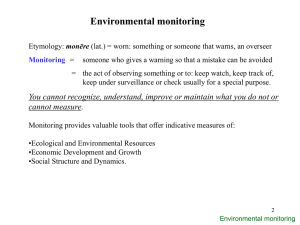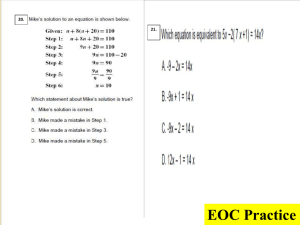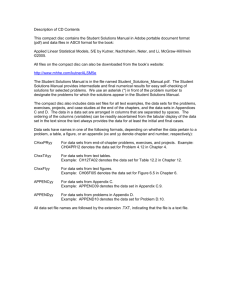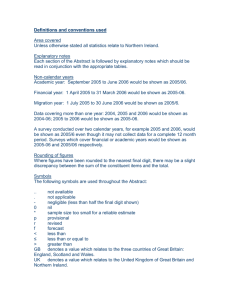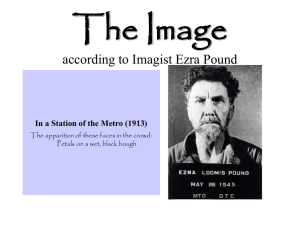Critical Reading Review for Test over Roots 1
advertisement
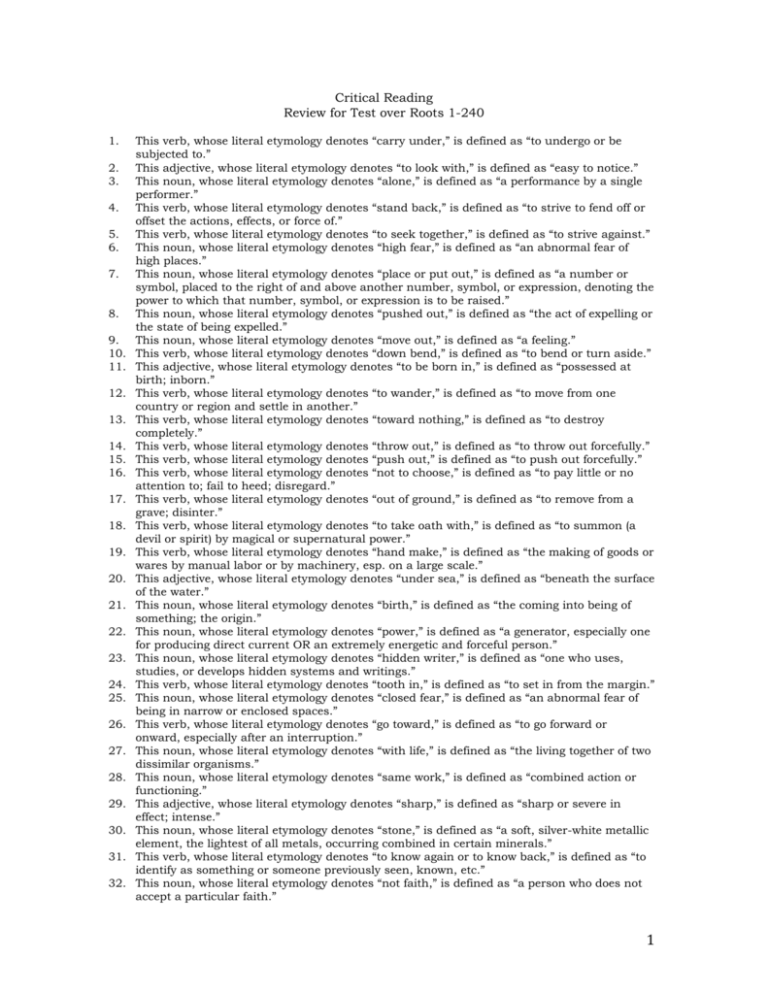
Critical Reading Review for Test over Roots 1-240 1. 2. 3. 4. 5. 6. 7. 8. 9. 10. 11. 12. 13. 14. 15. 16. 17. 18. 19. 20. 21. 22. 23. 24. 25. 26. 27. 28. 29. 30. 31. 32. This verb, whose literal etymology denotes “carry under,” is defined as “to undergo or be subjected to.” This adjective, whose literal etymology denotes “to look with,” is defined as “easy to notice.” This noun, whose literal etymology denotes “alone,” is defined as “a performance by a single performer.” This verb, whose literal etymology denotes “stand back,” is defined as “to strive to fend off or offset the actions, effects, or force of.” This verb, whose literal etymology denotes “to seek together,” is defined as “to strive against.” This noun, whose literal etymology denotes “high fear,” is defined as “an abnormal fear of high places.” This noun, whose literal etymology denotes “place or put out,” is defined as “a number or symbol, placed to the right of and above another number, symbol, or expression, denoting the power to which that number, symbol, or expression is to be raised.” This noun, whose literal etymology denotes “pushed out,” is defined as “the act of expelling or the state of being expelled.” This noun, whose literal etymology denotes “move out,” is defined as “a feeling.” This verb, whose literal etymology denotes “down bend,” is defined as “to bend or turn aside.” This adjective, whose literal etymology denotes “to be born in,” is defined as “possessed at birth; inborn.” This verb, whose literal etymology denotes “to wander,” is defined as “to move from one country or region and settle in another.” This verb, whose literal etymology denotes “toward nothing,” is defined as “to destroy completely.” This verb, whose literal etymology denotes “throw out,” is defined as “to throw out forcefully.” This verb, whose literal etymology denotes “push out,” is defined as “to push out forcefully.” This verb, whose literal etymology denotes “not to choose,” is defined as “to pay little or no attention to; fail to heed; disregard.” This verb, whose literal etymology denotes “out of ground,” is defined as “to remove from a grave; disinter.” This verb, whose literal etymology denotes “to take oath with,” is defined as “to summon (a devil or spirit) by magical or supernatural power.” This verb, whose literal etymology denotes “hand make,” is defined as “the making of goods or wares by manual labor or by machinery, esp. on a large scale.” This adjective, whose literal etymology denotes “under sea,” is defined as “beneath the surface of the water.” This noun, whose literal etymology denotes “birth,” is defined as “the coming into being of something; the origin.” This noun, whose literal etymology denotes “power,” is defined as “a generator, especially one for producing direct current OR an extremely energetic and forceful person.” This noun, whose literal etymology denotes “hidden writer,” is defined as “one who uses, studies, or develops hidden systems and writings.” This verb, whose literal etymology denotes “tooth in,” is defined as “to set in from the margin.” This noun, whose literal etymology denotes “closed fear,” is defined as “an abnormal fear of being in narrow or enclosed spaces.” This verb, whose literal etymology denotes “go toward,” is defined as “to go forward or onward, especially after an interruption.” This noun, whose literal etymology denotes “with life,” is defined as “the living together of two dissimilar organisms.” This noun, whose literal etymology denotes “same work,” is defined as “combined action or functioning.” This adjective, whose literal etymology denotes “sharp,” is defined as “sharp or severe in effect; intense.” This noun, whose literal etymology denotes “stone,” is defined as “a soft, silver-white metallic element, the lightest of all metals, occurring combined in certain minerals.” This verb, whose literal etymology denotes “to know again or to know back,” is defined as “to identify as something or someone previously seen, known, etc.” This noun, whose literal etymology denotes “not faith,” is defined as “a person who does not accept a particular faith.” 1 33. This noun, whose literal etymology denotes “down made or do,” is defined as “a shortcoming, fault, or imperfection.” 34. This adjective, whose literal etymology denotes “bad,” is defined as “full of, characterized by, or showing malice.” 35. This noun, whose literal etymology denotes “similar to speech or word,” is defined as “a similarity between like features of two things, on which a comparison may be based.” 36. This noun, whose literal etymology denotes “sun,” is defined as “an inert, gaseous element present in the sun's atmosphere and in natural gas.” 37. This adjective, whose literal etymology denotes “equal measure,” is defined as “of, pertaining to, or having equality of measure.” 38. This noun, whose literal etymology denotes “great stone,” is defined as “a stone of great size.” 39. This noun, whose literal etymology denotes “same name,” is defined as “a word having the same or nearly the same meaning as another in the language.” 40. This noun, whose literal etymology denotes “with feeling,” is defined as “an opinion or position reached by a group as a whole.” 41. This noun, whose literal etymology denotes “same feeling,” is defined as “harmony of or agreement in feeling, as between persons or on the part of one person with respect to another.” 42. This noun, whose literal etymology denotes “natural speech or word (aka, study),” is defined as “the branch of biology dealing with the functions and activities of living organisms and their parts, including all physical and chemical processes.” 43. This verb, whose literal etymology denotes “with seek,” is defined as “to acquire by force of arms; win in war.” 44. This verb, whose literal etymology denotes “to follow toward,” is defined as “to institute legal proceedings against.” 45. This noun, whose literal etymology denotes “wise,” is defined as “a person or group in the second year of any endeavor.” 46. This adjective, whose literal etymology denotes “to stand against,” is defined as “firmly or stubbornly adhering to one's purpose, opinion, etc.” 47. This noun, whose literal etymology denotes “with stand,” is defined as “a resident of a district or member of a group represented by an elected official.” 48. This verb, whose literal etymology denotes “breath toward,” is defined as “to long, aim, or seek ambitiously.” 49. This adjective, whose literal etymology denotes “many arts/skills,” is defined as “of, pertaining to, or offering instruction in a variety of industrial arts, applied sciences, or technical subjects.” 50. This verb, whose literal etymology denotes “broken out,” is defined as “to burst forth.” 51. This adjective, whose literal etymology denotes “out of time,” is defined as “done, spoken, performed, etc., without special advance preparation.” 52. This verb, whose literal etymology denotes “breath out,” is defined as “to come to an end; terminate.” 53. This noun, whose literal etymology denotes “touch,” is defined as “a line, curve, or surface meeting another line, curve, or surface at a common point and sharing a common tangent line or tangent plane at that point.” 54. This adjective, whose literal etymology denotes “standing,” is defined as “not moving or flowing; motionless.” 55. This adjective, whose literal etymology denotes “looking around,” is defined as “heedful of circumstances and potential consequences; prudent.” 56. This noun, whose literal etymology denotes “with writing,” is defined as “compulsory enrollment, especially for the armed forces; draft.” 57. This verb, whose literal etymology denotes “to make right,” is defined as “to set right; correct.” 58. This verb, whose literal etymology denotes “to climb up,” is defined as “to increase, enlarge, or intensify.” 59. This noun, whose literal etymology denotes “far feeling,” is defined as “communication through means other than the senses, as by the exercise of an occult power.” 60. This verb, whose literal etymology denotes “to build with,” is defined as “explain the meaning of; interpret.” 61. This noun, whose literal etymology denotes “touch,” is defined as “acute sensitivity to what is proper and appropriate in dealing with others, including the ability to speak or act without offending.” 2 62. This noun, whose literal etymology denotes “together or with speech or word,” is defined as “reasoning from the general to the specific.” 63. This noun, whose literal etymology denotes “with touch,” is defined as “a disease that is or may be transmitted by direct or indirect contact.” 64. This verb, whose literal etymology denotes “weigh out,” is defined as “to lay out or spend” 65. This noun, whose literal etymology denotes “hold below,” is defined as “to keep in existence; maintain.” 66. This noun, whose literal etymology denotes “look toward,” is defined as “a way in which something can be viewed by the mind.” 67. This verb, whose literal etymology denotes “free or loose,” is defined as “to find a solution to.” 68. This verb, whose literal etymology denotes “to sit before,” is defined as “to hold the position of authority; act as chairperson or president..” 69. This verb, whose literal etymology denotes “with down climb,” is defined as “to go down to the level of one considered inferior; lower oneself.” 70. This verb, whose literal etymology denotes “enough,” is defined as “to fulfill.” 71. This adjective, whose literal etymology denotes “against society,” is defined as “shunning the society of others; not sociable.” 72. This noun, whose literal etymology denotes “far look,” is defined as “an arrangement of lenses or mirrors or both that gathers visible light, permitting direct observation or photographic recording of distant objects.” 73. This verb, whose literal etymology denotes “under write,” is defined as “to sign (one’s name) at the end of a document.” 74. This verb, whose literal etymology denotes “back ask or seek,” is defined as “to impose an obligation on; compel.” 75. This adjective, whose literal etymology denotes “to make or do sign,” is defined as “having or expressing a meaning; meaningful.” 76. This noun, whose literal etymology denotes “all,” is defined as “a remedy for all diseases, evils, or difficulties; a cure-all.” 77. This noun, whose literal etymology denotes “choose good,” is defined as “one who usually expects a favorable outcome.” 78. This verb, whose literal etymology denotes “with weighing,” is defined as “to offset; counterbalance.” 79. This noun, whose literal etymology denotes “death pledge,” is defined as “a temporary, conditional pledge of property to a creditor as security for performance of an obligation or repayment of a debt.” 80. This noun, whose literal etymology denotes “change form,” is defined as “a transformation, as by magic or sorcery.” 81. This noun, whose literal etymology denotes “across send,” is defined as “something that is sent.” 82. This adjective, whose literal etymology denotes “equal measure,” is defined as “of or exhibiting equality in dimensions or measurements.” 83. This verb, whose literal etymology denotes “sail,” is defined as “to plan, record, and control the course and position of (a ship or aircraft).” 84. This noun, whose literal etymology denotes “same name,” is defined as “one of two or more words that have the same sound and often the same spelling but differ in meaning, such as bank (embankment) and bank (place where money is kept).” 85. This adjective, whose literal etymology denotes “work,” is defined as “characterized by rich abundance; luxuriant.” 86. This noun, whose literal etymology denotes “warn toward,” is defined as “cautionary advice or warning.” 87. This noun, whose literal etymology denotes “two fold,” is defined as “deliberate deceptiveness in behavior or speech.” 88. This noun, whose literal etymology denotes “mind word or speech (aka study),” is defined as “the science that deals with mental processes and behavior..” 89. This noun, whose literal etymology denotes “foot,” is defined as “one who goes on foot.” 90. This noun, whose literal etymology denotes “together sound,” is defined as “an extended piece in three or more movements for orchestra.” 91. This noun, whose literal etymology denotes “prove or honest” is defined as “suspension of a jail sentence.” 92. This verb, whose literal etymology denotes “to shine light on” is defined as “to clarify or make clear.” 3 93. This adjective, whose literal etymology denotes “great spirit” is defined as “greathearted: noble and generous in spirit.” 94. This noun, whose literal etymology denotes “make or do” is defined as “the power to produce an effect.” 95. This adjective, whose literal etymology denotes “throughout year” is defined as “lasting for an indefinitely long time; enduring.” 96. This adjective, whose literal etymology denotes “strong” is defined as “the Italian word for ‘loud’ in music dynamics.” 97. This adjective, whose literal etymology denotes “not knowing” is defined as “lacking education or knowledge.” 98. This adjective, whose literal etymology denotes “pour toward” is defined as “plentiful; extravagant.” 99. This noun, whose literal etymology denotes “self written” is defined as “one’s own signature.” 100. This noun, whose literal etymology denotes “hand write” is defined as “a book, document, or other composition written by hand.” 101. This noun, whose literal etymology denotes “blood love” is defined as “any of several hereditary blood-coagulation disorders in which the blood fails to clot normally.” 4
